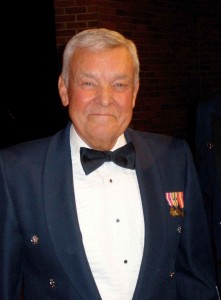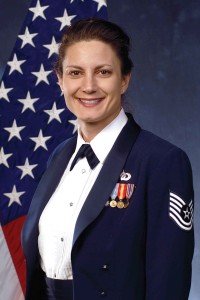The military and band have a longstanding connection at State, dating to 1890, according to Kevin Kessler, who is in his first year as South Dakota State’s director of athletic bands. Kessler discovered that fact while conducting research on the marching band’s history. His research indicates what is now known as The Pride of the Dakotas has been in continuous operation since a declaration in the South Dakota Board of Regents’ minutes providing for a military band.
“That was August 1890,†said Kessler, who has produced a nearly 200-page document on The Pride’s history for his dissertation to complete his doctorate program at the University of Iowa. “They’ve been here consistently performing since 1890 for mostly military functions, ROTC maneuvers on the campus green, etc. There aren’t a lot of mentions of the band performing with the military. There are a few mentions of the band performing with the military, but we know they did it a lot.â€
Kessler said he assumes the reason there isn’t much documentation of the band performing with the military was because it was part of the everyday activities. “It was just so common that the band supported the military maneuvers, it was part of the routine. It was mentioned the first couple of times that the band and the cadet corps did maneuvers on the campus green.â€
Until the 1920s, individual members of the band were expected to purchase their own uniforms. “Some of them were officers in the cadet corps, some were enlisted men, so there was this hodge-podge,†Kessler said. “The ROTC contributed quite a bit of money so they could have common uniforms. The big reason I could discern that they gave the money was so the band could have sharp-looking uniforms for cadet corps performances and inspections. It looked good to have the band dressed in its best as well.â€
When professor Carl Christensen, also known as “Christy,†left State in 1954, he was the last band director to have a rank of any kind or any mention with the ROTC. Christensen’s rank was a ROTC rank and also came as a result of the band being the official band for the South Dakota National Guard in 1915.
Band, ROTC part
By the 1940s, the band was not allowed to use any ROTC-funded uniforms, and the Students’ Association gave money and helped raise additional funds. In the 1960s, the band stopped playing for the pass and review activities of Governor’s Day.
However, that does not mean ROTC students are unwelcome in The Pride today, nor that its alumni do not go on to have military careers.
From Collegiates Dance Orchestra director to Air Force band leader
Loren Johnson ‘57/’59 came to South Dakota State to play in the Collegiates Dance Orchestra, which was run by and for the students, without the endorsement of the Music Department. “Many of my friends from Huron, including Jimmy Marso, John Ludtka, Stewart Christensen, Gerald Peppers, Norman Peppers and Murph Monahan were already playing with the Collegiates and I knew they needed a lead trumpet,†Johnson said.
The Huron native paid his way through college by playing dances and proms around South Dakota and Minnesota with the Collegiates Dance Orchestra. “We also played for the annual Military Ball, Hobo Day dance, and other dances at State,†Johnson said. “Big bands were very popular in the ’50s, and I had a great time playing for those dances. We had a 10-piece band and played the Harry James and Glenn Miller—old big-band style.â€
Johnson earned his bachelor’s degree in music and English and then earned a master’s degree in education. Johnson was in the first class to graduate with a degree in music, and in graduate school, to hold the position of teaching assistant in the music department.
One of Johnson’s most embarrassing, but memorable, days at State was during Hobo Day activities in 1953 when he was a freshman.
“You know the tradition where all the male students grow out their beards until Hobo Day?†Johnson asked. “Well, we band members weren’t allowed to grow beards, so, the leader of my fraternity took me to the ‘Kangaroo Court’ where they made me march from the Administration Building to the Jungle (the student union, which was then at Pugsley Hall). I had to play the SDSC fight song, solo, on my trumpet with a bunch of Blue Keys honorary frat boys marching behind me.
It was my penalty for not growing a beard.
“It was quite embarrassing and quite the show, but I’ll never forget it.â€
Career in music, military
Lt. Col. Johnson served on active duty for 29 years as a U.S. Air Force Band Commander and Conductor. His assignments included leading Air Force Bands stationed in Washington, D.C., California, Georgia, Colorado, Ohio, Panama and Nebraska.
While stationed in the Panama Canal Zone, Johnson took the Air Force Southern Command Band on goodwill tours to all of the Central and South American countries, some repeatedly. During his time in the Air Force, he had the honor of conducting Air Force Band concerts and ceremonies for seven U.S. presidents and eight presidents from other countries, as well as all of the presidents in Central and South America.
Johnson met his wife, Lynette Risch Johnson, during his senior year at State. She was a freshman playing first flute. She said she encouraged Johnson to make all the trips to the far corners of the Western Hemisphere while she raised their three children in all of the Air Force base locations because she knew that music keeps one young.
While they claim to be retired, both are active musicians in Estes Park, Colorado. Loren, who is 80 years young, conducts the 60-member Estes Park Community Band and the Lutheran Choir, and plays trumpet in the Estes Park Oratorio Society Orchestra, Estes Park’s Jazz Big Band, and its Kings of Swing. He also goes on a tour or cruise twice a year with the Lonny Lynn Orchestra out of Omaha, Nebraska. Johnson also feels honored to play taps for military funerals and services.
The couple has three children, Lesli Johnson Griffen, Neil Loren Johnson, and Noel David Johnson and 11 grandchildren.
2-year-old piano player becomes U.S. Air Force Band clarinetist
Another SDSU grad took her love for music beyond her college years. Ani Berberian ’91 who completed her Bachelor of Arts degree in music from State, earned a master’s degree in clarinet performance from Arizona State University and then a doctorate degree from Michigan State University.
She has served on the faculties at the University of Colorado-Boulder, Missouri State University, Concordia University and the Missouri Fine Arts Academy.
Now, Berberian is a clarinetist for the U.S. Air Force Band in Washington, D.C. She joined the Air Force in 2002 and started her career for the U.S. Air Force Academy Band in Colorado. In 2010, Berberian had the opportunity to audition for the Air Force Band in Washington, D.C., and received the job and moved in January 2011. “We are the musical ambassadors in the Air Force. We wear a lot of different hats in the job. I really enjoy that part. The job entails a lot of variety, and I’m not doing the same thing everyday.â€
The band goes on national tours twice a year. “On the tours, we perform public concerts for the community. That really bridges the gap between Air Force and the community. The band’s missions are community relations, troop morale and recruiting. We also visit public schools to perform with students, and also listen to the students perform. The high school students are always curious about what we do, so we educate them on the Air Force and give them tips on how to be better players.â€
From piano to clarinet
Both of Berberian’s parents were music professors at State—her father, Hratch, a music history professor who also taught strings pedagogy, and her mother, Arpinee, taught applied voice. Berberian said her parents always encouraged music, and she began playing piano at 2. “My parents always encouraged music, but never forced it,†Berberian said.
She started playing the clarinet when she was 11. Berberian said it was her mother’s idea for her to play the clarinet. “I wanted to play the flute and the drums, but my mom said the clarinet was more of my personality,†she said.
But as far as a career, Berberian’s parents let her decide that path on her own. She started as a double major in pre-law and music, but by the end of the first semester, she decided to drop the law degree and added a degree in German.
Musical college years
Berberian played for The Pride for four years, and served as a principal clarinetist in the Symphonic Band. Her favorite tour with the SDSU Symphonic Band was one that spanned the state of Wyoming, and ended in Yellowstone.
After Berberian finished her doctorate, she talked with a friend who played in the Air Force band. “I actually thought I was the last person who would join the military, but once I got through basic training, I realized what we do is pretty special,†Berberian said.
Karissa Kuhle








